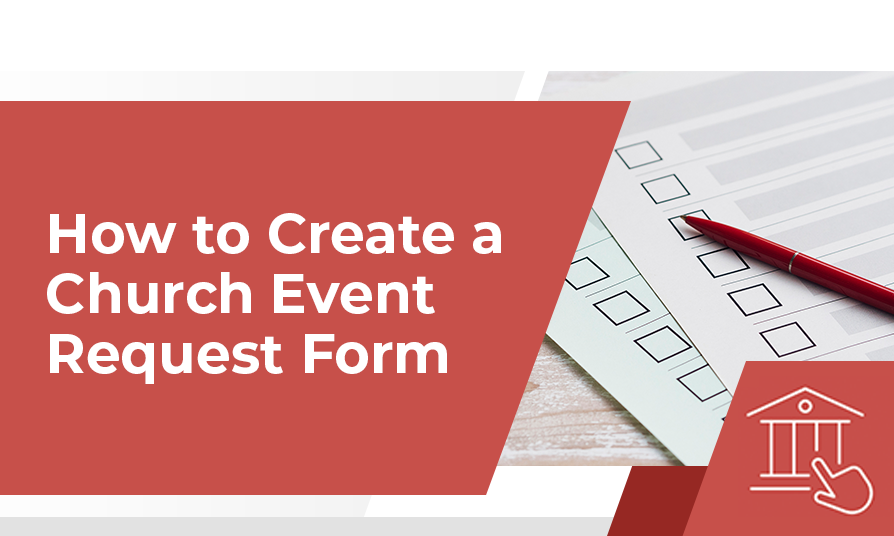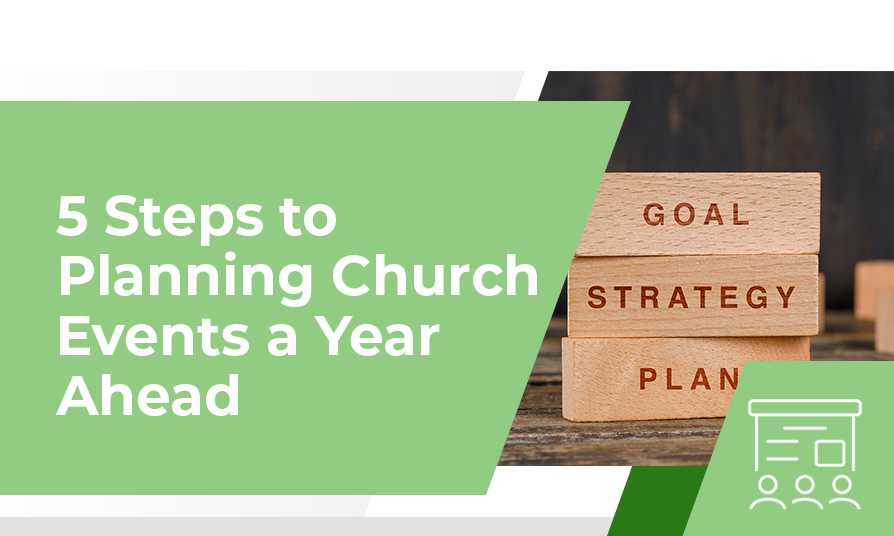Are you responsible for planning events at your church? If so, there are several pieces of information you’ll need before getting started. Setting up several meetings to obtain those details can be time-consuming. Instead, reach out to the ministry department (or senior leader) who’s hosting the event with a simple, yet comprehensive church event request form. Having a standard form to use in gathering information will save you time, and frustration, in the long run.
Here’s what to include in a church event request form:
Facilities
Because you’ll most likely be using your church facilities for your event, it’s important to know as much as you can about where and when this event will take place. Start with these questions:
- What day(s) will you need to use church facilities for this event?
- Will you need to set up for the event (decor, etc.) a day or more prior to the event? If so, when?
- What time will this event start?
- What time will staff and/or volunteers arrive the day of the event (the facilities team may need to know this so they can have the building unlocked in-time)?
- Will this event occur indoors at the church facility or outdoors?
- If the event is primarily outdoors, what is the contingency plan for inclement weather?
- If your church has multiple campuses, which campus will this event take place at?
- What room(s) will this event require?
- How does each room need to be set up?
- Will you need a platform or stage?
- How many tables will you need?
- How many chairs will you need?
- What audio/visual setup will you need?
- Who from the event team is responsible for cleaning up after the event?
Catering
Most events involve some type of food or catering. Find out food and refreshment needs with these questions:
- Will you serve food or drinks at this event?
- Who is providing the food or drinks?
- Will the group or person providing food and drinks need access to the church kitchen?
- Does this provider have a food handler’s permit?
- Do you need plates, napkins, utensils, and cups? Or will the group/person providing the food and drinks provide these items as well?
Communications
Getting the word out about the event is how you’ll reach your attendee goal. Gather this information to maximize your communications.
- When will this event occur?
- Who is the target audience for this event (couples, young families, singles, new to the church, new believers, men, women, etc.)?
- What is the theme of the event?
- Who are the speakers at this event?
- What is the communications budget for this event? (Your communications team will want to know this so they can decide whether to run Facebook ads, promote on local radio/TV, etc.).
- Why are we hosting this event?
- Will we sell any merchandise at this event?
- Will any guest speakers want to sell merchandise at this event?
Childcare
If you have parents attending, providing childcare might be a good option.
- Will we provide childcare for event attendees?
- How are you gathering childcare information (number of children expected, ages, special requirements, etc.)?
Security
Talk with your church’s security team to find out what information they’ll need to determine an event’s security requirements. Here are a few questions they may need you to answer (the key here is to know if arrivals and/or departures will happen during daylight hours):
- When are the first guests expected to arrive at the event?
- When are the last guests expected to leave the event?
- Will we provide childcare (they need to know this so they can provide security for the childcare areas)?
Finances
Make sure you know the overall budget for your event as well as how it’s broken down. These questions should get you the details you need:
- What is the budget for this event?
- Is the budget detailed by category (food, decor, speakers, etc.) or is it a lump sum?
- Who is responsible for the budget for this event?
- Will we sell tickets to this event? If so, for what price?
- Will we charge extra for childcare?
Event Registration
Like communications, event registration is key to hitting your attendee goal. No matter how registration is set up, it should be a simple process. Here’s the main question you need answered:
- Will registration be completed solely online or will we accept paper registrations?
Volunteers
Without volunteers to help with the event, you’re more likely to go over budget and become overworked. Here’s what to ask:
- How many volunteers will we need and in what roles?
- Who is responsible for coordinating volunteers?
How to Gather this Information
Now that you know what questions to ask, create an online church event request form so you can send a URL link to the person requesting the event. Consider creating separate forms for each ministry department so they don’t get overwhelmed with the length of a consolidated form. You can easily combine their answers into a single document once they respond.
If it’s the requestor’s first time completing the form, you may want to fill it out with them as they get comfortable with the process. Also, make sure to explain to your church staff why you need them to provide all of this information. Most people don’t like filling out forms, but if they know WHY you need all this detail (and that by providing it now, they have a much better chance at a successful event), they’re less likely to complain about it.
When to Gather this Information
Ideally, your church leadership team decides what events to host a year in advance. From there, if you’re responsible for planning events, you should start gathering information at least 6 months before an event. Of course, more time is needed for bigger events and less time for smaller/less complicated ones.
In conclusion, the church event planning process is going to go a lot smoother if you take the time to collect information about the event up front. To learn even more about pulling off successful church events, check out my book The Church Event Planning Toolkit.



